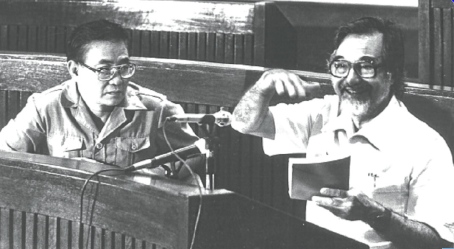When the proverbial camel enters the tent
The freedom to run a university independently rests on trust, not power
THE Higher Education Ministry announced the granting of autonomy to select universities last week. The announcement coincided with Royal Professor Ungku Abdul Aziz’s 90th birthday.

The Royal Professor has been quoted as saying that he will not be a vice chancellor of a university that is not autonomous, way before the announcement. He seems to have a deeper understanding of what a university is, and continues to be the Malaysian primary example of a vice chancellor.
He is a scholar, an academic leader, author, writer, a social entrepreneur, a master of lateral thinking, a photography enthusiast, a pantun lover — a Renaissance Man, as his student rightly described him in her tribute to this man of knowledge (New Straits Times, Jan 28).
Few vice chancellors after Pak Ungku, as he is fondly known, has his audacity — many are just grateful to be vice chancellor. Period.
In fact, in one meeting, I recall that a vice chancellor revealed that he preferred to be without autonomy! How things have changed.
The powers that be never seem to understand the importance of autonomy and academic freedom to the development of a university as an institution of knowledge generation and dissemination.
To some, autonomy is only possible in phases guided by an index as if the search for knowledge can be arbitrarily graded.
But indices ignore many intangible processes in knowledge acquisition such as attitude, teamwork and leadership styles.
The analogy put forward rather crudely at a gathering of vice chancellors not too long ago was that of a camel entering a tent (unta masuk khemah). And we were informed that this process (of the camel entering the tent) will be completed only in 2015!
It reminded me of another well-known story of the proverbial camel which enters a tent, and eventually pushes the tent owner out! This may explain why autonomy is such an issue since the tent owner feels threatened that he will be eventually edged out.
In short, autonomy is about power play! It is not about education or the university.
Be that as it may, it was a surprise that autonomy was pronounced during the Higher Education Minister Datuk Seri Mohd Khaled Nordin’s annual address last week, some three years earlier than scheduled.
Foremost is creating a complete ecosystem that must be present to ensure that autonomy is functioning.
If only hiring practices are given autonomy and not others such as governance and finance, then the ecosystem is incomplete and autonomy still cannot happen.
Second, it is about “trust” rather than “power”. Autonomy can only work if there is ample trust because you must be allowed to challenge the status quo. After all, the granting of autonomy is the point of departure.
Universities must be the game-changer in the future by being autonomous. Otherwise, they are irrelevant.
This takes us to the third point of letting the authority of ideas to prevail over ideas of the authority! The leadership style must be that of a maestro conducting a symphony, rather than resorting to “managerialism” as this column has argued repeatedly, inhibited by the various bureaucratic models of the camel entering the tent.
As the saying goes, the leader’s job is not to cover all the bases — it is to see that all bases are covered. In short, do not micromanage; let managers manage. Leaders must lead; academic leaders provide academic leadership!
This is where the element of trust becomes vital as it helps to nurture the ecosystem.
Trust necessarily goes hand in hand with accountability and responsibility, which is the crux of academic ethos in the search of knowledge.
To earn trust, you must first earn respect, not out of fear but out of sincerity and wisdom.
Mistakes — if done in good faith — are to be tolerated, otherwise the culture of creativity will never flourish, much less become acculturated.
It boils down to daring to be different in the quest for ideas and to translate them into solutions.
Pak Ungku has successfully displayed these traits when he embarked on studies on rural poverty and initiated Lembaga Urusan dan Tabung Haji some 50 years ago.
He pioneered the cooperative movement and created other education-based institutions such as museums, university press and even Dewan Bahasa dan Pustaka.
We are fortunate and grateful that Pak Ungku is still very much with us today at the crowning moment when Malaysian universities are given greater autonomy than before.
He continues to inspire us, especially academic leaders.
Given the new-found autonomy, we can look forward to the making of many more Renaissance (wo)men who also have the courage to dream big.
To quote Goethe: “Dream no small dreams for they have no power to move the hearts of men.”
Pak Ungku has moved our hearts.
We say “thank you”. May your life be blessed as you journey forward.
- The writer is vice chancellor of Albukhary International University
